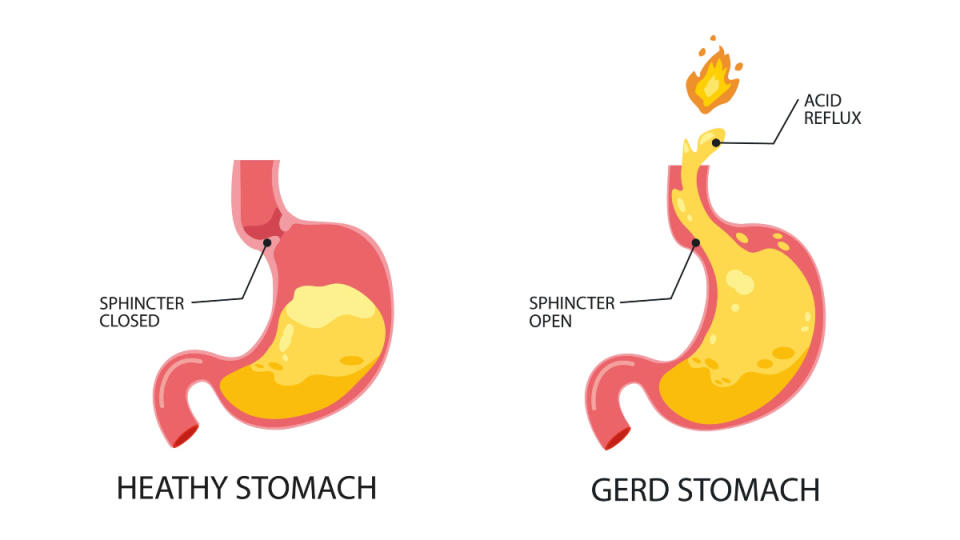Dentists Say *This* GI Bother Is a Sneaky Cause of Bad Breath — Plus How To Fix It
Morning breath. Yuck mouth. Halitosis. Whatever you call it, bad breath can leave your mouth feeling less than fresh (and dampen your confidence, too!). Although everyone has bad breath occasionally, if it continues even with good oral hygiene, it may point to an underlying stomach issue. The good news: If you're wondering how to eliminate bad breath from the stomach, it's easier than you may think. Here, experts explain why it happens and how to keep your mouth feeling fresh.
The link between the stomach and bad breath
You already know that most bad breath occurs because of oral issues such as cavities and gum disease. But it turns out gastrointestinal problems can also play a role. That’s because your mouth and stomach are directly connected by your esophagus, a tube that carries food to your stomach.
“Bad breath caused by gastrointestinal problems is due to the remnants of things like undigested food, regurgitated bile, and stomach acids making their way back up the esophagus,” explains Mirissa Price, DMD, a Harvard-trained, board-certified pediatric dentist. “If this occurs regularly in instances such as GERD, it creates a foul odor in the form of bad breath.”
GERD, or gastroesophageal reflux disease, occurs when a small ring of muscle called the lower esophageal sphincter (LES) weakens. This allows stomach acid and other stomach contents to creep back up into the esophagus. (Click through to discover which meds can make heartburn worse.)

“As you can imagine, when your stomach contents — including food and acid — end up in your mouth, you can develop bad breath from the food you just ate, bad bacteria growing in your mouth, and also from damage and decay occurring from the stomach acid,” says Sonia Sharma, MD, gastroenterologist with Keck Medicine of USC in Los Angeles.
But GERD isn't the only cause of bad breath that originates in your stomach. As Arturo Bravo, MD, a gastroenterologist at Houston Methodist Willowbrook Hospital, explains, several other gastrointestinal conditions cause a funky odor, too. That includes Zenker’s diverticulum, an “unusual outpouch in the esophagus,” and “Helicobacter pylori infection, a [type of bacterial] infection in the stomach," he says.
Related: 9 Natural Ways to Get Rid of Heartburn Fast at Night — And Wake Up Happy
How to tell if bad breath is from your stomach
Dr. Sharma says that bad breath caused by the stomach usually has a distinct acidic, bitter, or metallic taste. It can also be accompanied by symptoms such as “excessive coating on the tongue, the presence of inflammation in the gums or tonsils, and visible lesions on the tongue or inside the mouth,” says Fouad Moawad, MD, a board-certified gastroenterologist based in La Jolla, California. Excessive tongue coating refers to an increase in saliva production and a thicker, more noticeable “fur” on the tongue, both of which have been linked to GERD.
If your bad breath is caused by oral conditions such as gum disease, dry mouth or a bacterial infection, it likely wont' occur alongside any of other symptoms mentioned above. Oral issues like these are an incredibly common culprit behind funky breath. Why? The mouth is the perfect environment for capturing odors. “Food gets trapped between the teeth and under the tongue," Dr. Moawad explains. "And the cratered surface of the tongue can harbor microorganisms and bacteria that can lead to bad breath."
Two bad-breath tests
Not sure if your oral odor is coming from your mouth or your stomach? Heather Paul, CBDH, CRDH, a certified biological dental hygienist and certified registered dental hygienist, says there are two simple tests that can help you pinpoint the cause.
1. The floss test
For this quick home test, “manually floss under your gums as far as you can go on one of your back molars, then smell it,” Paul advises. If the floss has an offputting odor, “chances are you’re dealing with gum disease and it needs to be treated as soon as possible.”
Related: These Easy, Surprising Self-Care Tips Can Reverse Gum Disease, Say Dentists
2. The lick test
Another easy trick: The lick test. “Lick your hand with as much of your tongue as possible," Paul says. "Then wait a few seconds and take a whiff.” If your hand smells, Paul says your bad breath is likely caused by an oral issue rather than a gastrointestinal one.
If neither test results in abnormal or unpleasant smells, your bad breath is more likely to be cause by an underlying stomach issue instead.
The best toothpaste for bad breath
While targeting the underlying stomach issues behind your bad breath is important, you also likely want a speedy fix that can help eliminate odors now. And the right toothpaste can make all the difference!
“I would recommend any toothpaste that has either fluoride or hydroxyapatite to remineralize your teeth,” says Fatima Khan, DMD, a Houston-based dentist. “Especially if you suffer from GERD and have a loss of [tooth] enamel.” Remineralizing your teeth won’t necessarily freshen your breath, but it's important since GERD and other stomach issues damage the enamel (the outer, protective coating of your teeth).
Kyle Gernhofer, DDS, a dentist and the founder of DenScore agrees, adding that “the best toothpaste for people with GERD [and other bad breath caused by stomach conditions] targets odor-causing bacteria in the mouth and prevents enamel minerals from wearing away.”

Two that fit the bill: TheraBreath Fresh Breath Toothpaste (Buy from Amazon, $15.96 for two) and Dr. Jen Natural Remineralizing Toothpaste (Buy from Amazon, $20.89).
“TheraBreath and Dr. Jen were both founded by dentists,” Dr. Gernhoffer says. “TheraBreath has three types of toothpaste, all of which contain an oxygenating compound that prevents the growth of foul-smelling anaerobic bacteria in the mouth. It also contains fluoride which protects the tooth enamel from demineralizing as a result of having GERD.”
The best mouthwash for bad breath
Another easy way to eliminate bad breath from the stomach: mouthwash. Specifically, mouthwash containing odor-eliminating cetylpyridinium chloride (CPC). One to try: TheraBreath Healthy Gums Oral Rinse (Buy from Amazon, $17.62 for two).
“This rinse contains CPC, an ingredient that helps fight bad breath by targeting the bacteria that causes gingivitis and gum disease,” Dr. Gernhoffer explains. “Compared to some of the larger mouthwash brands, TheraBreath products do not contain alcohol, sodium lauryl sulfate (SLS), and other ingredients that may have unwanted side effects” such as dry mouth or gum irritation.
For the best way to eliminate bad breath from the stomach using mouthwash, Dr. Bravo suggests rinsing and gargling before bed. That’s because “the rinse may remain in your mouth for a longer period of time and have a greater effect.”
Another pro tip: Dr. Price says to look for toothpaste and mouthwashes awarded the ADA Seal of Acceptance. “The ADA Seal of Acceptance is important because it means an over-the-counter dental product has been independently evaluated by scientific experts to make sure the product is safe and effective.”
Related: Your Toothbrush Is Teeming With Bacteria: Dentists Share How to Clean It
How to eliminate bad breath from the stomach
Good toothpaste and mouthwash can freshen your breath in the short term. But for long-lasting relief from bad breath caused by the stomach, you'll need some simple strategies that help target the root cause. Here are 6 tips to get started.
1. Chew gum
To eliminate bad breath caused by stomach issues on the go, pop a piece of gum. Eddy Sofer, MD, a gastroenterologist at Keck Medicine of USC, says chewing gum is a tried and true method for treating bad breath. “And, as an added bonus, the buffer capacity of saliva may be some help in [treating] GERD.”
Dr. Moawad agrees, adding that “chewing gum is a great way to stimulate salivary gland production, which is alkaline and can neutralize stomach acid, thereby improving GERD and bad breath.” However, when bad breath is caused by GERD, Dr. Moawad recommends avoiding peppermint-flavored gum. “Peppermint can relax the lower esophageal sphincter and potentially worsen reflux.”
2. Sit tall
As tempting as it may be cozy up for a short snooze, doing so can actually make bad breath caused by GERD worse. Lying down while food’s still digesting allows stomach acid, bile, and food particles to flow backward into the esophagus, triggering an unwanted odor.
A better bet: Waiting at least three hours after eating before lying down to relax or going to bed. In fact, folks who do so are significantly less likely to experience GERD symptoms such as heartburn and esophageal damage.

3. Jot down what you eat
The key to outsmarting GI-triggered bad breath before it even starts? Pinpointing the foods that can worsen GERD. And simply jotting down what you eat in a notepad or free app on your phone — as well as when you experience GERD — is a great place to start.
A food diary helps you identify which foods trigger your symptoms and make your bad breath worse, says Dr. Sharma. “Common trigger foods for GERD include acidic things like tomato sauce or coffee, spicy foods, sugar, and fatty foods,” she adds. By tracking meals and snacks, you can pinpoint trigger foods and nip bad breath in the bud.
4) Try an oral probiotic
“Probiotics are good-for-you bacteria that live in your gut and help support your overall well-being,” explains Dr. Khan. “Oral probiotics are a similar concept, except they're specifically designed to support the health of your mouth and throat.”
The goal of an oral probiotic is to bring your mouth and throat back into balance. “When your mouth is in a state of imbalance due to poor habits, stress, medications, and health issues, you're more prone to anaerobic bacteria which produces and causes bad breath," Dr. Khan says. "The use of probiotics is said to crowd out the ‘bad’ bacteria, stabilize pH, improve saliva quality, and address the root cause of bad breath.”
One to try: Great Oral Health, Advanced Probiotics (Buy on Amazon, $26.09). Interested in probiotics for gut health, too? Click through to learn how to make probiotic-rich yogurt at home.
5) 'Scrape' your tongue
Since your mouth and stomach are so intertwined, practicing good oral hygiene is essential. You already know the basics that Dr. Sharma recommends:
Brushing your teeth after meals, in the morning and before bed
Flossing at least once a day
Rinsing your mouth with water after eating
Addressing GERD and/or other underlying stomach issues
But there's one more sneaky area many folks forget to pay attention to: Your tongue! A few quick swipes with a tongue scraper can work wonders when it comes to eliminating bad breath. “A tongue scraper can lower levels of bacteria that produce volatile sulfur compounds (VSCs) and significantly improve bad breath,” says Dr. Khan. One to try: MasterMedi Tongue Scraper (Buy from Amazon, $9.95 for two).
For a quick how-to, check out the video below.
6) Be a quitter
When it comes to smoking, that is! We all know that tobacco stains and tar cling to smokers' teeth and tongues. But it can also impact GI function. “Smoking can affect the lower esophageal sphincter by making it relax,” explains Dr. Price. “The LES acts as a barrier between the esophagus and stomach. When relaxed, it allows a pathway for acid reflux to make its way into the esophagus," triggering bad breath. (Click through to learn how at-home strength training helped one woman quit smoking for good.)
For more ways to improve your oral health:
These Easy, Surprising Self-Care Tips Can Reverse Gum Disease, Say Dentists
Your Toothbrush Is Teeming With Bacteria: Dentists Share How to Clean It
10 Best Electric Toothbrushes for Receding Gums
This content is not a substitute for professional medical advice or diagnosis. Always consult your physician before pursuing any treatment plan.
First For Women aims to feature only the best products and services. We update when possible, but deals expire and prices can change. If you buy something via one of our links, we may earn a commission. Questions? Reach us at [email protected]
